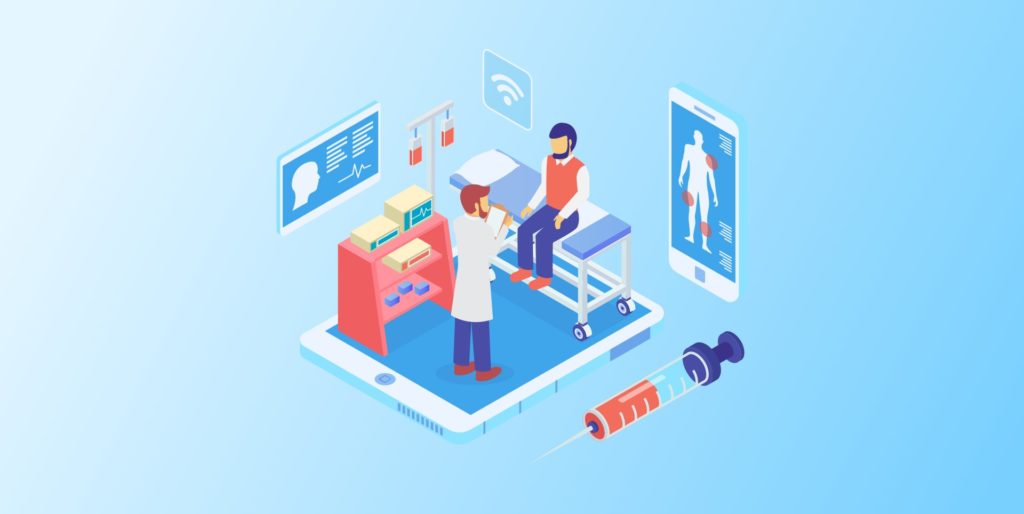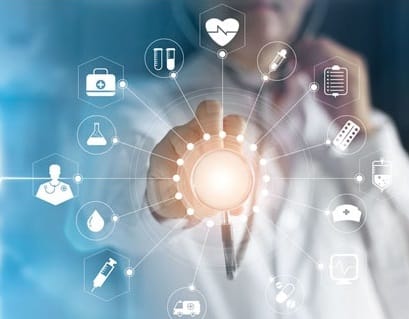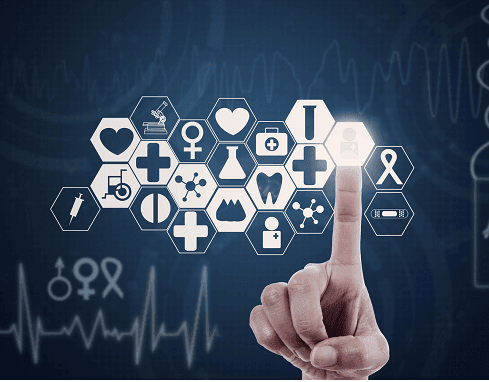How IoT is Transforming the Healthcare Industry

The adoption of the Internet of Things (IoT) has revolutionized the healthcare industry, leveraging its vast potential and multiple applications, from remote monitoring to medical device integration. In healthcare, IoT is used for interconnected devices such as monitoring systems, sensor machines, and detectors that capture real-time health information. This data is stored on a centralized cloud/server for later analysis to enhance healthcare services.
The IoT market in healthcare is expected to grow to USD $188 billion by 2024, with a CAGR of 27.6% during the forecast period. Major players in the industry are aiming to capitalize on this growth by improving their solutions or investing in the adoption of such technologies.
The Rise of IoT in Healthcare
IoT in healthcare involves embedding sensors, devices, and software into medical equipment and consumer health products to collect and exchange data. This interconnectivity enables real-time monitoring, data analysis, and improved decision-making. The adoption of IoT in healthcare is driven by the need for more personalized, efficient, and effective patient care.
Key Applications of IoT in Healthcare
1. Wearable Devices
Wearable technology has become a prominent application of IoT in healthcare. Devices such as fitness trackers, smartwatches, and medical wearables monitor various health metrics including heart rate, blood pressure, glucose levels, and physical activity. These devices collect real-time data that can be analyzed to track a patient’s health trends over time.
For instance, continuous glucose monitors (CGMs) provide diabetic patients with real-time glucose level readings, enabling them to manage their condition more effectively. Similarly, wearable ECG monitors can detect irregular heart rhythms and alert users to potential issues before they become serious. The data collected by these devices is often synced with mobile apps or cloud platforms, allowing healthcare providers to monitor patients remotely and make timely interventions.
2. Remote Patient Monitoring
Remote patient monitoring (RPM) is another significant application of IoT in healthcare. RPM allows healthcare providers to monitor patients outside traditional clinical settings using connected devices. This technology is especially beneficial for managing chronic conditions such as hypertension, diabetes, and heart disease.
RPM systems use sensors and devices to collect health data from patients at home and transmit it to healthcare providers in real-time. This continuous monitoring helps in early detection of potential health issues, reduces hospital readmissions, and improves patient engagement. For example, patients with heart failure can use remote monitoring devices to track their weight, blood pressure, and heart rate, providing their healthcare team with valuable insights into their condition.
3. Smart Hospitals
The concept of smart hospitals integrates IoT technology into various aspects of hospital management and operations. Smart hospitals use connected devices and systems to streamline processes, enhance patient care, and improve operational efficiency. Key features of smart hospitals include:
- Electronic Health Records (EHR): IoT-enabled EHR systems facilitate seamless data exchange between different departments and healthcare providers. This integration ensures that patient information is accessible in real-time, improving coordination and reducing errors.
- Asset Tracking: IoT technology is used to track medical equipment, supplies, and even patients within the hospital. This helps in optimizing resource utilization, reducing equipment loss, and improving patient safety.
- Environmental Monitoring: Smart hospitals use IoT sensors to monitor environmental conditions such as temperature, humidity, and air quality. This ensures a safe and comfortable environment for patients and staff, and helps maintain compliance with health and safety regulations.
4. Telemedicine
Telemedicine leverages IoT technology to provide remote medical consultations and care. Through video conferencing, remote diagnostics, and digital health tools, patients can access medical services without the need for physical visits. Telemedicine platforms often integrate with wearable devices and mobile health apps, enabling healthcare providers to access real-time health data during virtual consultations.
Telemedicine has proven to be particularly valuable in rural and underserved areas where access to healthcare services is limited. It also offers convenience and flexibility for patients, allowing them to receive care from the comfort of their homes.
Digital Technologies Transforming the Healthcare Industry
Healthcare is poised for a transformation beyond recognition. The need to collect, store, and analyze patient data has driven the industry to embrace various cutting-edge digital technologies.
1. Internet of Things (IoT)
IoT-enabled smart and connected solutions, such as smart sensors, wearable devices, and health monitoring systems, are set to unleash the potential growth of the healthcare industry by improving treatment through efficient health tracking. The growing popularity of IoT in healthcare has given rise to modern techniques, including the Internet of Medical Things (IoMT). The IoMT is an ecosystem of smart devices that communicate with each other in real time to generate results. This reduces human error significantly and eliminates many decision-making delays.
2. Cloud Computing
Cloud technology secures patient data and ensures regulatory compliance while allowing healthcare providers to deliver advanced technological care. It extends the patient experience into the digital realm. Various public, private, and hybrid cloud platforms offer better access to patient records.
3. Artificial Intelligence (AI)
AI applications have accelerated the speed and accuracy of medical diagnoses. AI aids in the research and development of new medical products and automates repetitive tasks such as routine paperwork, scheduling, and timesheets, thereby improving efficiency and reducing costs. Additionally, AI helps doctors analyze historical patient data to gain insights for better treatments.
Read more: Benefits of Using IoT and AI Together
Benefits of IoT in Healthcare
1. Enhanced Patient Care
IoT technology significantly enhances patient care by providing real-time monitoring and personalized treatment. Continuous data collection from wearable devices and remote monitoring systems enables healthcare providers to make informed decisions and tailor treatments to individual needs. Early detection of health issues through IoT devices helps in preventing complications and improving patient outcomes.
2. Improved Efficiency
IoT streamlines healthcare processes and reduces operational inefficiencies. Automated data collection, remote monitoring, and real-time analytics minimize the need for manual interventions and administrative tasks. This leads to more efficient use of healthcare resources, faster diagnosis, and reduced wait times for patients.
3. Cost Reduction
The implementation of IoT in healthcare can lead to significant cost savings. Remote monitoring reduces the need for frequent in-person visits, lowering transportation and facility costs. Additionally, IoT technology helps in preventing hospital readmissions and managing chronic conditions more effectively, reducing overall healthcare expenses.
4. Better Data Management
IoT facilitates better data management by centralizing health information and providing comprehensive insights. Integrated EHR systems and data analytics platforms enable healthcare providers to access and analyze patient data more efficiently. This improves decision-making, enhances care coordination, and supports research and development.
Challenges and Considerations
Digital healthcare systems use IoT and big data to maintain seamless connections with patients. These systems are increasingly integrated with various medical wearable technologies that provide real-time patient information. However, several challenges need to be addressed before widespread adoption:
1. Data Security and Privacy
The security and privacy of health data are major concerns with IoT implementation. The collection, transmission, and storage of sensitive health information require robust security measures to protect against unauthorized access and data breaches. Ensuring compliance with regulations such as HIPAA (Health Insurance Portability and Accountability Act) is crucial for maintaining patient trust and safeguarding data.
2. Integration and Interoperability
The integration of various IoT devices and systems can be complex. Healthcare organizations need to ensure that different devices and platforms can communicate and exchange data seamlessly. Interoperability issues can hinder the effectiveness of IoT solutions and create barriers to achieving comprehensive and coordinated care.
3. Data Management
The volume of data generated by IoT devices can be overwhelming. Efficient data management practices are essential to handle, analyze, and utilize the vast amounts of health data collected. Implementing effective data storage, processing, and analysis solutions is crucial for deriving meaningful insights and ensuring data accuracy.
4. Cost of Implementation
The initial cost of implementing IoT technology in healthcare can be high. Investing in connected devices, infrastructure, and training can be a significant financial burden for healthcare organizations. However, the long-term benefits and cost savings associated with improved efficiency and patient care can outweigh the initial investment.
Conclusion
IoT is transforming the healthcare industry by enhancing patient care, improving efficiency, and enabling innovative solutions. From wearable devices and remote monitoring to smart hospitals and telemedicine, IoT applications are revolutionizing how healthcare is delivered and managed. Despite the challenges of data security, integration, and cost, the benefits of IoT in healthcare are significant and far-reaching. As technology continues to evolve, IoT will play an increasingly vital role in shaping the future of healthcare and improving the quality of care for patients worldwide.




